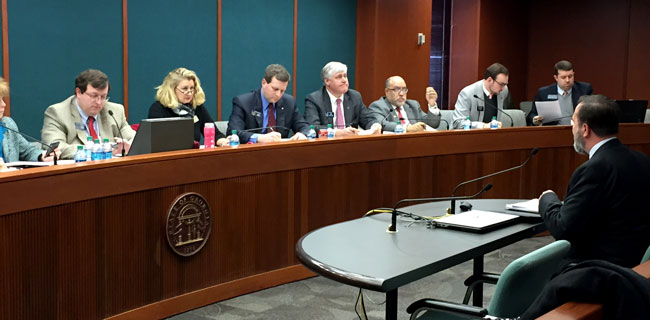
With only 12 days remaining in the 2015 Georgia General Assembly, the 40-day session is over half complete. Thus far, of the 778 bills that have been proposed (569 in the House of Representatives and 209 in the Senate), 83 have passed the House of Representatives and 143 have passed the Senate. At this point, only two bills that are not local legislation have been signed into law by Governor Nathan Deal. House Bill 75, which is Georgia’s supplemental budget, and Senate Bill 5, which relates to the Savannah Harbor Expansion Project.
Moving forward, there are two particularly important dates in the legislative process. Legislative day 40, referred to as Sine Die and currently slated for April 2, is of obvious importance, as any unpassed legislation dies after the final day of the session. However, legislative day 30, referred to as Crossover Day, is equally important. On Crossover Day, scheduled for March 15, legislation that has not passed out of the chamber in which it originated is dead. Therefore, after Crossover Day no new bills are introduced and the focus is placed solely on legislation already passed by either the House or Senate. While the final days of the Georgia General Assembly promise to be interesting, legislators have already dealt with many controversial and important issues to this point.
Budget
Every year, Georgia’s Governor signs into law two budgets. The first budget allocates spending based on revenue projections by the Governor’s Office of Planning and Budget for the upcoming fiscal year (July 2015 – June 2016). Fiscal year 2016’s budget has passed the House, and it is currently being debated among Appropriations sub-committees in the Senate. In addition to the budget for the upcoming fiscal year, the General Appropriations Act is a supplemental budget passed to amend the budget for the current fiscal year. In the supplemental budget, spending is cut if the previous revenue projection was too high or excess money is allocated if the projection was too low. Governor Deal signed into law the supplemental budget, House Bill 75, which will allocate surplus funds because state revenue in fiscal year 2015 exceeded its projection.

Transportation
The Georgia legislature has addressed transportation funding, the primary concern for many legislators this session, in House Bill 170. This bill has already endured many revisions, and has just recently been voted out of the House Transportation Committee. Appropriations bills, which authorize the government to spend money, are required by the Georgia Constitution to originate in the House of Representatives. Consequentially, the Senate must wait on the House bill before they can offer their solutions via modifications to the bill.
In the original version of the transportation bill, the House proposed restructuring the method by which the government taxed gas. The proposed plan would convert the motor fuel tax to solely an excise tax, rather than the current combination of excise and sales taxes. Excise taxes apply specifically to one good and are levied at a set cost per unit (i.e. 29.2 cents per gallon), rather than as a percentage. However, by converting to an excise tax, the state government will now collect a large sum of money (estimated at approximately $600 million) which was previously local revenue. This redistribution of tax dollars has led to heated debates over how city governments, county governments, and school boards will reclaim lost tax revenue. The House Transportation Committee has altered House Bill 170 four times in an attempt to address these concerns. House Bill 170 passed the House Transportation Committee, and on March 5, 2015, passed the full house by a vote of 123 to 46. The Senate will now receive the transportation bill, and is expected to alter the legislation significantly.
Cannabis Oil
House Bill 1, a bill regarding the legalization of cannabis oil for medical purposes, passed the House of Representatives by a vote of 152 to 2 on February 25. Representative Allen Peake’s (R – Macon) current bill legalizes cannabis oils that have less than 5 percent THC, the chemical responsible for marijuana’s psychological effects, for patients suffering from 9 conditions: cancer, multiple sclerosis, seizure disorders, ALS (Lou Gehrig’s Disease), Crohn’s disease, Parkinson’s disease, mitochondrial disease, sickle cell anemia, and fibromyalgia. The House will now transmit House Bill 1 to the Senate, which is expected to cut the qualifying medical conditions solely to child seizures. Additionally, the Senate may take the cannabis oil legislation “hostage” and refuse to pass the bill unless the House passes Senate Bill 1, Ava’s Law. 
Autism
Ava’s Law is a piece of legislation that would require state-regulated health plans to provide treatments to autism patients six years of age and younger. Currently the legislation has a cap that would limit patients to $35,000 of coverage per year. After failing to pass the House at the end of last session, Ava’s Law was reintroduced in the Senate this year where it has already passed unanimously. Ava’s Law is meeting opposition in the House because insurance premiums would increase if the bill were to pass. The Senate is adamant that this legislation, which will impact an estimated 30,000 children in Georgia, must become law.
Advanced Placement United States History
Some members of the Georgia legislature are questioning the Advanced Placement (AP) United States History courses, which are administered nationally through the College Board. Many legislators are averse to the College Board’s AP United States History framework which is being criticized as revisionist and leftist. Senate Resolution 80, authored by Senator William Ligon, Jr. (R – Brunswick), demands a revision of this framework. During a joint Education Committee meeting, Republican members of the House and Senate called for either drastic revisions to the curriculum or the establishment of a new testing company in order to dissolve the College Board’s monopoly on AP courses.
Religious Freedoms
Senator Joshua McKoon (R – Columbus) has sponsored what is arguably the most controversial legislation of the session thus far. His Georgia Religious Freedoms Restoration Act, Senate Bill 129, aims to protect religious expression from governmental interference. However, opponents see this legislation as an attack on the homosexual community. Majority Leader Bill Cowsert (R – Athens) attempted to propose an amendment during the February 19 Senate Judiciary Committee meeting, which would not allow discrimination to be authorized as a religious exercise. Thus, businesses could not discriminate and be lawfully protected by citing religious exercise as the reason for discrimination. However, Sen. McKoon—the chair of the committee—refused to allow the amendment because it was not offered in a “timely manner,” causing the bill to be tabled for later discussion. On March 5, it passed the full Senate by a party line vote of 37 to 15, without amendments.

Other Legislation
In addition to these key issues, the legislature is debating many other important topics. Governor Deal promoted his education plan to a select delegation of legislators over the weekend of February 27 to March 1 by offering a tour of several Louisiana schools. These schools utilize the opportunity school district that is a key component of his education plan. Apparently the tour was a success, as on March 5 the full Senate voted to pass the Governor’s education plan sponsored in the chamber by Senator Butch Miller (R – Gainesville). Another education bill, if passed, would move the cut-off date for Kindergarteners forward from September 1 to July 1. This bill requires Kindergarteners to be 5 years old by July 1 and would result in many students beginning Kindergarten at an older age. Horse racing and pari-mutual wagering has generated intense debate due largely to the religious community’s opposition to gambling in Georgia. House Resolution 2 proposes term limits on Representatives and Senators; however, this resolution will almost certainly meet stern opposition as legislators are resistant to imposing term limits on themselves.
The Georgia General Assembly has been productive thus far, but many important bills are still a long way from becoming law. The already heated debates are sure to intensify as the stakes grow higher by the day. Let the real March Madness begin!


